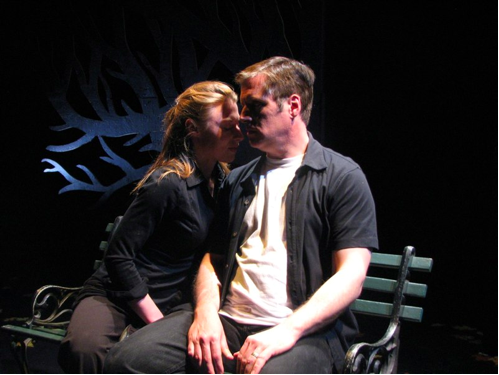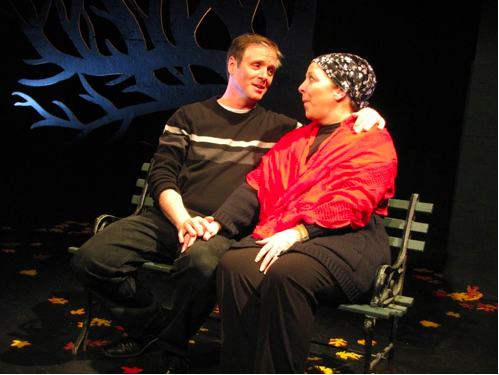Theater Review: A Poetic ‘Apple’
Imagine this day. See it in your mind. The sun on your face. The spring in your mouth. Your heart deep inside. No future. No past. No time. Just this day. This moment. — Apple by Vern Thiessen

Listening to the Moment: Eliza Lay (Sam) and Dave Sanfacon (Andy) in Apple. Photo: Greg Maraio
Apple by Vern Thiessen. Directed by Greg Maraio. Presented by Phoenix Theatre Artists and Company One, at Boston Playwrights’ Theatre, through April 3
Reviewed by Alyssa Machado
In Apple, Andy, a middle-aged man in a failing marriage, meets Samantha on a park bench on the day he is laid-off from the government job he loves. Sam, an attractive medical student, coaxes him to close his eyes and really “listen to the moment” in the park, to appreciate the beauty of right now and forget the disappointments of the past. Intrigued and a little overwhelmed by her awkward flirtations, Andy lets “things change” as she suggests. They kiss, and their affair begins.
Although Apple‘s plot is rooted in cliché—a 40-something guy in a failing marriage has an affair with a beautiful, young student and becomes conflicted when his estranged wife discovers she has cancer—the play doesn’t wallow in the potential melodrama posed by disease and the affair.
Instead, the script explores, poetically and refreshingly, a series of emotional moments, the kind of tiny but revelatory turning points that accumulate “when things change” in romantic relationships. These interludes grow into an intimate and touching picture of the natural seasons of love and loss, the “sweet spring,” “dying fall,” and “clean winter.”
Playwright Vern Thiessen’s nuanced approach is particularly impressive given the obvious opportunity for soap opera, the juicy invitation to indulge in big dramatic revelations and overwrought explosions of anger. He wisely keeps much of the action internalized and grounded in guarded emotions.
For example, when Andy’s wife, Lyn, discovers the affair, she comes to the realization gradually, never saying a word. We sense her discovery through the changes of expression on her face, aided by the adroit placing of pauses. Also, Thiessen, to his credit, doesn’t spend much time dredging up his characters’ past; the play, like the utterly spontaneous Sam, focuses on the emotions of “right now,” particularly Lyn’s dignified acceptance of her cancer as well as her rediscovery of her relationship.
Thiessen adeptly uses monologues and repetition of lines to connect the play’s series of moments together to create a fluid sense of time. These techniques imaginatively invite the audience to see the events and relationships through Sam’s eyes: “No future. No past. No time. Just this day. This moment.” Yet Andy’s monologues are in the past tense, implying that his experience is the inevitable result of what has already occurred. Apple makes artful use of this paradox because the scenes of love and loss are dramatized in front of us, creating a tension between past and present.
Thiessen’s reinforces this fluidity of time by repeating dialogue like the start of the conversation Sam and Andy have each time they meet at the park bench.
SAM: Beautiful day.
Pause.
ANDY: Yes.
SAM: The lake.
ANDY: Yes.
SAM: The trees.
ANDY: Yes.
SAM: The park.
ANDY: Mm.
These lines are echoed many times—when the couple meet as strangers, when they are first caught up in the excitement and hope of their affair, when Lyn’s cancer interferes, and when Andy makes his final decision about his future. The repeated phrases generate a sense of history so that the changes in the delivery of the lines make the developments in their relationship strikingly evident.
Apple isn’t unblemished, however. While the characters emotions are realistic, the storyline tends to be highly coincidental and frequently implausible. For example, Sam hires Lyn, out of all the realtors in their town, to sell her apartment. At one point Lyn’s doctor can’t make an appointment and, of course, Sam, a medical student, is assigned to be the wronged wife’s nurse. One fortuitous meeting is acceptable; two heads into fantasy territory.
Speaking of suspending disbelief, do beautiful, mysterious, young women frequently approach depressed, average-looking middle-aged guys in the park, seduce them in a few minutes, proceed to have amazing sex with them, and then declare that they aren’t looking for any type of commitment? Andy’s quick agreement makes sense, but Thiessen never adequately demonstrates why Sam, who is the least-developed character, is so intrigued by the bland Andy.
Thankfully, the New England premiere production of Apple, presented by the Phoenix Theatre Artists and Company One, overcomes these relatively minor distractions. Director Greg Maraio, who also came up with the costumes, designed a simple but appropriate set. It consists of a green park bench in the center of the stage, two matching smaller black benches on stage right and stage left, and the black silhouette of a tree downstage, split in half to allow entrances in the middle. Sunset colored leaves litter the stage of the small black box theater.
On a practical level, the benches allow the three actors to remain onstage during the entire play and avoid distracting exits. Having the women remain in the background also emphasizes that they remain in Andy’s thoughts even when he isn’t with them. The fallen leaves set the park scene nicely, but also serve as symbols of letting go, falling in love, and falling apart.
A play like Apple, with a fairly passive main character and more internal, emotional action than external, physical action, requires a talented cast of actors to mine the vulnerability of the characters and prevent them from becoming caricatures. Dave Sanfacon (Andy), Eliza Lay (Sam), and Barbara Douglass (Lyn) are up to the task.
Sanfacon’s Andy is endearingly earnest and vulnerable as he searches, often haplessly, for something missing from his life. His eventual rediscovery of his wife, Lyn, is convincingly natural and so gradual that the audience barely realizes it is happening.
An average guy who just got laid-off while dealing with an unhappy marriage compels empathy, but Sanfacon also makes the character likable enough to make his marital transgressions forgivable. Portrayed as a bewildered man tentatively searching for elusive happiness and love, Andy doesn’t set out to cause pain to others.

Dave Sanfacon (Andy) and Barbara Douglass (Lyn) in Apple. Photo: Greg Maraio
Eliza Lay faces the hardest challenge, portraying Sam as the representation of the “sweet spring” stage of love, a time when everything is suddenly blooming with possibilities, excitement, and lust. She has to convince us of Sam’s sudden fall for Andy even though the script’s reasoning—Sam was left with a “hole in her heart” when her mother died—is wafer thin.
Lay uses stammering and awkward pauses in her monologues, which take the form of medical lectures, to effectively emphasize Sam’s vulnerability. However, because she didn’t stammer or pause as much in her scenes with Andy and Lyn, it was difficult to determine early on whether the performer’s choice was deliberate or if Lay was struggling with her lines. Increasing Sam’s awkwardness in her group scenes would help dispel doubts that Sam is a little too confident to desperately need someone like Andy.
Lay is at her best in the later scenes, the “dying fall,” of her relationship with Andy, her progression from painfully awkward to quietly desperate to bravely resigned. At those moments, Lay’s acting transcends the script; Sam’s love becomes convincing.
Barbara Douglass, who plays the self-absorbed, driven, and to-the-point real estate agent Lyn, begins the play with a swear-laden rant about a co-worker and follows that up by mercilessly nagging and scolding Andy, who has just been laid off. Douglass succeeds in making Lyn a thoroughly unlikeable if strong personality, though the actress seems too self-aware during the rant, speaking quickly and occasionally not enunciating.
Douglass steals the show, however, with her transition to a more restrained, approachable, and almost noble Lyn once she is diagnosed with cancer. She keeps the character’s inner core of steel (“cancer is not a gift!”) while revealing layers of fear and vulnerability. In addition, Sanfacon and Douglass have an easy chemistry in their later scenes, whether they are joking about their day or having about a poignant discussion about the practical details of disease.
Thiessen’s works are frequently produced in Canada and have won many prestigious prizes, including the Governor General’s Literary Award, Canada’s highest honor for playwriting (for Einstein’s Gift in 2003). Apple (winner of the 2002 Elizabeth Sterling Haynes Award for Outstanding New Play) suggests that he deserves the accolades.
The play may be a little implausible at times, but its insightful and often lyric exploration of relationships lifts it above its minor flaws, while the Phoenix Stage Artists and Company One’s straightforward, well-acted presentation elevates this moving script even higher.
Tagged: Alyssa Machado, Apple, Boston-theater, Canada, Company One, Greg Maraio, Phoenix Theatre Artists
